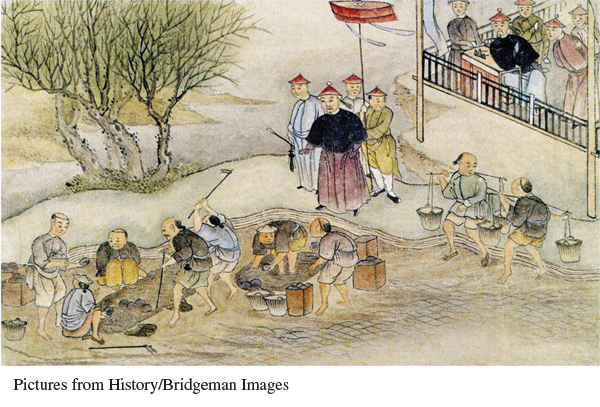A History of Western Society: Printed Page 796
A History of Western Society, Value Edition: Printed Page 764
A History of Western Society, Concise Edition: Printed Page 795
Chapter Chronology
The Opening of China
Europe’s development of robust offshoots in sparsely populated North America, Australia, and much of Latin America absorbed huge quantities of goods, investments, and migrants. Yet Europe’s economic and cultural penetration of old, densely populated civilizations was also profoundly significant. Interaction with such civilizations increased the Europeans’ trade and profit, and they were prepared to use force, if necessary, to attain their desires. This was what happened in China, a striking example of the pattern of European intrusion into non-Western lands.
For centuries China had sent more goods and inventions to Europe than it had received, and such was still the case in the early nineteenth century. Trade with Europe was carefully regulated by the Chinese imperial government, ruled by the Qing (ching), or Manchu, Dynasty in the nineteenth century. Qing officials required all foreign merchants to live in the southern port of Guangzhou (Canton) and to buy and sell only to licensed Chinese merchants. Practices considered harmful to Chinese interests were strictly forbidden.
Page 797
For years the little community of foreign merchants in Guangzhou had to accept this Chinese system. By the 1820s, however, the dominant group of these merchants, the British, were flexing their muscles. Moreover, in opium — that “destructive and ensnaring vice” denounced by Chinese decrees — the British found a means to break China’s self-imposed isolation. British merchants smuggled opium grown legally in British-occupied India into China, where its use and sale were illegal. Huge profits and growing addiction led to a rapid increase in sales. By 1836 the British merchants in Guangzhou aggressively demanded the creation of an independent British colony in China and “safe and unrestricted liberty” in their Chinese trade. Spurred on by economic motives, they pressured the British government to take decisive action and enlisted the support of British manufacturers with visions of vast Chinese markets to be opened to their goods as well.
At the same time, the Qing government decided that the opium trade had to be stamped out. It was ruining the people and stripping the empire of its silver, which went to British merchants to pay for the drug. The government began to vigorously prosecute Chinese drug dealers. In 1839 it sent special envoy Lin Zexu to Guangzhou to deal with the crisis. Lin Zexu punished Chinese who purchased opium and seized the opium supplies of the British merchants, who then withdrew to the barren island of Hong Kong. He sent a famous letter justifying his policy to Queen Victoria in London.

Commissioner Lin Zexu Overseeing the Destruction of Opium at Guangzhou, 1839 A formidable Chinese bureaucrat known for his competence and high moral standards, Lin Zexu was sent to Guangzhou (Canton) as imperial commissioner in late 1838 to halt the illegal importation of opium by the British. He made a huge impact on the opium trade within a matter of months. As a result, British troops invaded China, and the ultimate British victory in the Opium Wars forced China to grant European merchants one-sided trade agreements.
(Pictures from History/Bridgeman Images)
The wealthy, well-connected British merchants appealed to their allies in London for support, and the British government responded. It also wanted free, unregulated trade with China, as well as the establishment of diplomatic relations on the European model, complete with ambassadors, embassies, and published treaties. Using troops from India and taking advantage of its control of the seas, Britain occupied several coastal cities and in the first of two Opium Wars forced China to give in to British demands. In the Treaty of Nanking in 1842, the imperial government was required to cede the island of Hong Kong to Britain forever, pay an indemnity of $100 million, and open up four large cities to unlimited foreign trade with low tariffs.
Page 798
With Britain’s new power over Chinese commerce, the opium trade flourished, and Hong Kong developed rapidly as an Anglo-Chinese enclave. But disputes over trade between China and the Western powers continued. Finally, the second Opium War (1856–1860) culminated in the occupation of Beijing by seventeen thousand British and French troops, who intentionally burned down the emperor’s summer palace. Another round of one-sided treaties gave European merchants and missionaries greater privileges and protection and forced the Chinese to accept trade and investment on unfavorable terms in several more cities. Thus did Europeans use opium addiction and military aggression to blow a hole in the wall of Chinese seclusion and open the country to foreign trade and foreign ideas.
